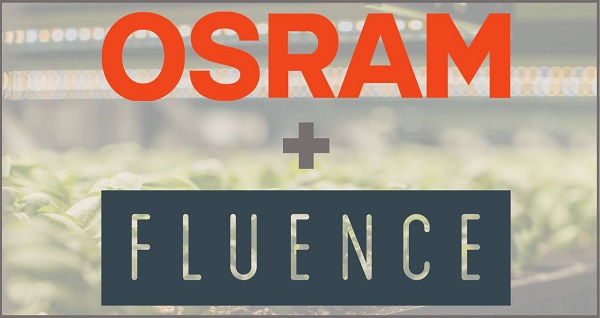Osram is taking the next step in its development of intelligent plant growth solutions by acquiring Fluence Bioengineering, Inc. of Austin, Texas. Fluence specializes in LED-based horticultural systems, using Osram LED chips, for a wide variety of applications including vertical farming, especially in urban areas. Potential crops range from salad greens and herbs to medicinal plants. Osram and Fluence have agreed not to disclose the purchase price.
 |
|
(Image: Fluence Bioengineering) |
“Fluence is opening the floodgates to a huge future market,” said Stefan Kampmann, CTO of OSRAM Licht AG. “Its extensive knowledge of the horticulture market and possible applications, combined with Osram’s expertise in lighting technologies, sensors and connectivity, will position us as a leading horticultural solutions provider.” Associated smart farming software can be integrated into Osram’s Internet of Things (IoT) platform Lightelligence, which brings the digitalization of lighting control to a new level. By combining and analyzing sensor data, Lightelligence enables significant progress in automation and intelligent applications far beyond lighting.
Increasing population and continued urbanization are intensifying the demand for fresh food, especially in densely populated cities around the world. To meet the needs of these areas, growers must tap the potential of greenhouses and vertical cultivation systems, utilizing smart lighting, sensor systems and artificial intelligence. In addition to growing healthy and flavorful food, vertical farms reduce the need for long-distance transportation routes. They also lessen the need for pesticides, fertilizers and excessive water use, and ultimately reduce spoilage. These technologies, which also can be used for growers of medicinal plants, contribute to the goal of sustainable agriculture.
LED-based solutions from Fluence help growers meet their yield and sustainability goals by increasing harvests up to 25 percent, reducing energy costs by as much as 50 percent and, through the targeted use of light, improving the quality and nutritional content of plants. Considering also that approximately 40 percent of food is spoiled between the producer and the supermarket shelf, there is an additional ecological aspect to benefit the smart farming approach.
“In the future, self-learning software algorithms will create and optimize digital plant models in order to cultivate tailor-made salads and herbs for platform partners such as supermarkets, online grocery shops and pharmaceutical companies,” Kampmann said.
Osram has increased its involvement in the horticulture sector over the last several years. The company has developed research and specialty luminaires that enable tailor-made light recipes to be controlled for specific plant types. In 2017, Osram invested in the Munich-based startup Agrilution which develops grow boxes with LED lighting for home use.
Fluence Bioengineering, upon closing, will be positioned within Osram’s Professional and Industrial Applications segment in the Specialty Lighting business unit. “We are excited to be teaming up with Osram to drive forward this global expansion and expand our digital product portfolio. Our new and existing customers will benefit from our partnership with Osram in all matters relating to light and sensors”, said Fluence CEO Nick Klase.





 CN
TW
EN
CN
TW
EN






